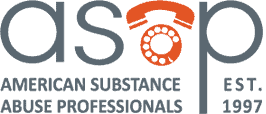Success Story: Treatment, Research, Collaboration
Treatment
Treatment for substance use disorders lies at the heart of the ASAP mission. While ASAP does not offer direct clinical treatment, individuals who participate in ASAP programs do receive treatment that is prescribed by their Substance Abuse Professional (SAP). What ASAP does provide is a strategic framework, based upon Department of Transportation (DOT) return-to-duty procedures, for accessing and managing evaluations, monitoring treatment and tracking follow-up testing. The SAP process, as we call it, rewards compliance (abstinence) and removes rewards for non-compliance (relapse). As a structure for delivering treatment, it makes practically any kind of SAP recommendation for treatment extremely effective. In fact, approximately 85% of individuals who participate in ASAP programs successfully complete treatment/education and return of work safely! Compare this to national treatment completion statistics, as reported by the federal government that routinely fall in the 30%–40% range.
Research
Published academic studies of SUD treatments that use managed reward systems have consistently concluded that this approach, called Contingency Management (CM), is the most effective methodology for addressing SUDs. However, most applications of CM have taken place in laboratories, i.e., controlled experimental settings.
One of the pre-eminent centers for the study of CM for SUDs is the Johns Hopkins University Center for Learning and Health (CLH). Under the direction of Kenneth Silverman, Ph.D., the CLH has been a leader in the field, building an impressive body of research drawn from experimental use of an innovative Therapeutic Workplace. The Therapeutic Workplace uses contingency managed skills training and employment to reduce and extinguish substance use. The logical next step for the CLH has been to extend the study of CM treatment to “real world” employment settings. Enter ASAP.
Collaboration
ASAP success prompted CLH interest in using ASAP to help conduct the “real world” employment phases of their experimental investigations. Since 2009, ASAP and the CLH have been collaborating to study the effectiveness of employment-based CM treatment. Participants first complete an initial phase of education and job skills training, and then advance to the Therapeutic Workplace. The third phase is “real world” community employment placements where follow-up drug testing and case management are conducted by ASAP. Three NIH grants have been funded to date.




